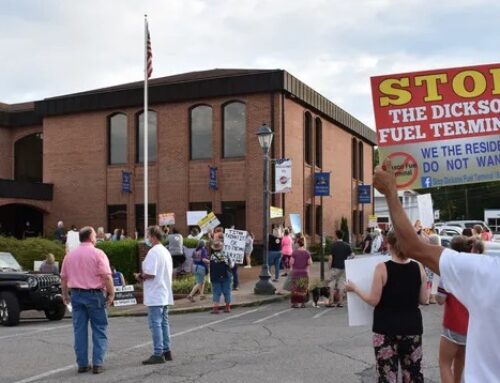Joe Towns’ threat to challenge finance disclosure law influenced secret vote to reduce his fines
Longtime Memphis lawmaker Joe Towns threatened to file a lawsuit challenging the constitutionality of Tennessee’s campaign finance disclosure laws if a settlement of Towns’ outstanding fines was not accepted, members of the Tennessee Registry of Election Finance board said Wednesday at a public meeting.

The new information shed more light on a secret April 1 vote in which the board voted by email — outside of public view and without public notice -— to reduce Towns’ fines from $65,000 to $20,900. The vote was taken just hours before the noon deadline on April 2 for Towns to qualify to be on the election ballot. Towns would have been barred from the ballot by state law if he had not resolved his fines by then.
Towns, a member of the House of Representatives since 1995, made the threat via his lawyer, Mike Stewart, also a longtime Democratic lawmaker and the prominent chair of the House Democratic Caucus, according to board member comments at the Wednesday meeting.
The April email vote is being challenged in a Davidson County Chancery Court as a violation of the Open Meetings Act. Tennessee Coalition for Open Government is one of the plaintiffs, along with several members of the news media.
Chairman Tom Lawless said in the meeting that he believed the board’s action in April violated the Open Meetings Act.
Board re-votes to try to cure potential open meetings violation
The board’s main action on Wednesday as it related to Towns was to try to “cure” the potential April violation in the event a judge finds it did indeed violate the open meetings law. Members debated the best way to word their action, and whether it would be sufficient to keep Towns on the ballot.
The Open Meetings Act declares “[a]ny action taken at a meeting in violation of this part shall be void and of no effect,” but courts have ruled that it doesn’t mean a governing body is prohibited forever from taking the same action again in a future meeting in a way that complies with the law.
Ultimately, the board voted Wednesday 4-2 to “reconsider and reaffirm” their earlier action approving a settlement with Towns.
Board members Lawless and Tom Morton voted no and David Golden, Paige Burcham Dennis, Henry Fincher and William (Paz) Haynes, III voted in favor.
Pressure on board included ‘credible’ threat to undo campaign finance law
In describing the late-night vote earlier this year, one board member said he didn’t appreciate the pressure put on the board.
“I don’t like on the eve of a deadline a gun being put to my head to come up with a one-off settlement approval,” said board member David Golden. “Once we get this in our rearview mirror perhaps we can take up the issue of future settlement timelines so the people who are engaged in settlement discussions understand that if they don’t settle by a certain time, they simply will not have the opportunity for this board or this body to approve it.”
Another board member, Henry Fincher, also shed light on the April decision. He said that Towns had “made it clear” that he would pursue with counsel a constitutional challenge to Tennessee’s financial disclosure law if they didn’t approve it before the deadline. Fincher said that if such a lawsuit were successful, “the Registry would go from having teeth to no teeth” and he said the board did not want to invite such trouble.
He also spoke favorably of Towns, saying he was a “voice for minorities” and the “downtrodden” at a Legislature that is made up mainly of white people.
Later during the meeting Fincher explained again why he thought the board should affirm acceptance of the settlement, praising Towns as a “tireless servant” in the Legislature for 24 years, and reminding the board of his “credible threat of a constitutional challenge to the Registry’s main source of leverage, which is the qualification bar for nonpayment of penalties.”
The Tennessee statute barring someone with outstanding penalties from being on the ballot is T.C.A. § 2-10-110 (c)(2), which states: “If a civil penalty lawfully assessed and any lawfully assessed cost attendant to the penalty are not paid within thirty (30) days after the assessment becomes final, or by the qualifying deadline for election, whichever is earlier, the candidate owing such civil penalty shall be ineligible to qualify for election to any state or local public office until such penalty and costs are paid.”
Board chair calls Towns the ‘poster child’ of not following finance disclosure law
Lawless said that he “absolutely” abhorred Towns’ threat, made via Stewart, to try to take the Registry’s “stick away” by challenging the financial disclosure laws. But he said the law was not the board’s job.
“If a court says we don’t have the constitutional right to do what we did, that’s not our job. Our job is to follow what the legislature already has in place.”
He also called Towns “the poster child of not doing what the law required and yet he was one of those making the laws.”
“Yes, Representative Towns has been there a long time but now all of the sudden he finds out he’s not going to be able to get on the ballot. And we’re here at the last second, actually late in the day the day before, being told we’ve got to do, we’ve got to do, we’ve got to do. We have to drop everything and act or we’re going to get sued because we are just overstepping our bounds.”
Secret vote process was advised by AG, executive director says
Bill Young, the executive director of the registry, has said he followed the advice of the Attorney General in getting approval of the settlement by the board in April, contacting each one individually and asking them to vote by email. There was not an open meeting and there was no public notice before the vote.
He also told the board that he thought that the lowered settlement amount was appropriate and that he thought Towns would be in compliance going forward with campaign financial disclosure requirements.
Towns still threatening lawsuit
For his part, Towns on Monday before this week’s Registry board meeting told The Daily Memphian that he expects to remain on the ballot since the board made the decision.
“I can’t be held accountable for their damn mistakes. No,” he is quoted as saying in The Daily Memphian article, adding that he would file a lawsuit against anyone who tried to have him removed from the ballot.



